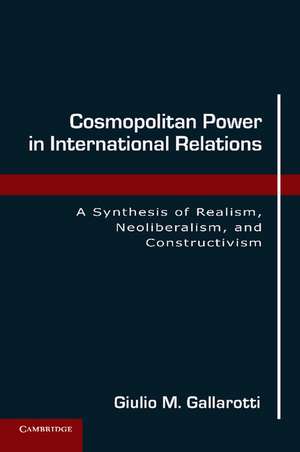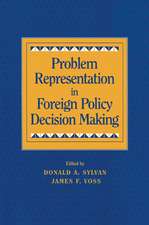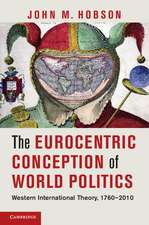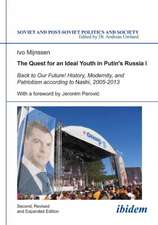Cosmopolitan Power in International Relations: A Synthesis of Realism, Neoliberalism, and Constructivism
Autor Giulio M. Gallarottien Limba Engleză Paperback – 26 sep 2010
| Toate formatele și edițiile | Preț | Express |
|---|---|---|
| Paperback (1) | 263.79 lei 6-8 săpt. | |
| Cambridge University Press – 26 sep 2010 | 263.79 lei 6-8 săpt. | |
| Hardback (1) | 556.38 lei 6-8 săpt. | |
| Cambridge University Press – 17 oct 2010 | 556.38 lei 6-8 săpt. |
Preț: 263.79 lei
Nou
Puncte Express: 396
Preț estimativ în valută:
50.48€ • 54.82$ • 42.41£
50.48€ • 54.82$ • 42.41£
Carte tipărită la comandă
Livrare economică 23 aprilie-07 mai
Preluare comenzi: 021 569.72.76
Specificații
ISBN-13: 9780521138123
ISBN-10: 0521138124
Pagini: 326
Ilustrații: 8 b/w illus.
Dimensiuni: 152 x 229 x 19 mm
Greutate: 0.45 kg
Editura: Cambridge University Press
Colecția Cambridge University Press
Locul publicării:New York, United States
ISBN-10: 0521138124
Pagini: 326
Ilustrații: 8 b/w illus.
Dimensiuni: 152 x 229 x 19 mm
Greutate: 0.45 kg
Editura: Cambridge University Press
Colecția Cambridge University Press
Locul publicării:New York, United States
Cuprins
Introduction; 1. The theory of cosmopolitan power; 2. Crucial-case textual analysis of the founding fathers of Realism: the classical inspirations; 3. Crucial-case textual analysis of the founding fathers of Realism: the modern inspirations; 4. Case studies of soft empowerment: free trade, the classical gold standard, and dollarization; 5. Case study of hard disempowerment: US foreign policy and the Bush doctrine; 6. Case study of soft empowerment: the power of modern American culture; 7. Conclusions.
Recenzii
'In this well-argued and thoroughly researched book, the author makes a compelling case for both the importance of soft power in international relations and the deep historical roots of the concept. It is recommended reading for both scholars and policy makers.' David A. Baldwin, Princeton University
'Combining political philosophy, history, and current international politics, Gallarotti has written a penetrating analysis of the central questions of the forms and use of power. His book shows familiar authors in a new light, makes us re-think much conventional wisdom, and brings complex concepts to bear with great skill.' Robert Jervis, Columbia University
'Giulio Gallarotti makes a major contribution to the study of power (hard, soft, smart) and relates each type of power to the dominant paradigms (realism, liberalism, cosmopolitanism) that shape our understanding of international relations. This is a very thought-provoking book.' Joseph S. Nye, Harvard University
'Finally: a hard look at soft power. With some attention to Gramscian ideas about hegemony and constructivist ideas about the 'power' of norms, Gallarotti cleverly stages a confrontation between realism and liberal institutionalism, in which realists are exposed for emphasizing the importance of 'hard power' in theory, all the while accommodating the reality of soft power in their empirical assessments of world politics.' Nicholas Onuf, Florida International University
'Many international relations specialists draw piecemeal on all three of the reigning paradigms - realism, liberalism, and constructivism. But few try to think systematically about how to integrate their seemingly divergent insights in a way that makes sense as a whole. Gallarotti takes a long overdue step in that useful direction.' Jack Snyder, Columbia University
'Combining political philosophy, history, and current international politics, Gallarotti has written a penetrating analysis of the central questions of the forms and use of power. His book shows familiar authors in a new light, makes us re-think much conventional wisdom, and brings complex concepts to bear with great skill.' Robert Jervis, Columbia University
'Giulio Gallarotti makes a major contribution to the study of power (hard, soft, smart) and relates each type of power to the dominant paradigms (realism, liberalism, cosmopolitanism) that shape our understanding of international relations. This is a very thought-provoking book.' Joseph S. Nye, Harvard University
'Finally: a hard look at soft power. With some attention to Gramscian ideas about hegemony and constructivist ideas about the 'power' of norms, Gallarotti cleverly stages a confrontation between realism and liberal institutionalism, in which realists are exposed for emphasizing the importance of 'hard power' in theory, all the while accommodating the reality of soft power in their empirical assessments of world politics.' Nicholas Onuf, Florida International University
'Many international relations specialists draw piecemeal on all three of the reigning paradigms - realism, liberalism, and constructivism. But few try to think systematically about how to integrate their seemingly divergent insights in a way that makes sense as a whole. Gallarotti takes a long overdue step in that useful direction.' Jack Snyder, Columbia University
Notă biografică
Descriere
True national power in the modern world is only delivered through combining traditional means of power with more enlightened means.













